The Incompatibilities Between Generative AI and Art: Q&A with Ted Chiang
12 August 2025
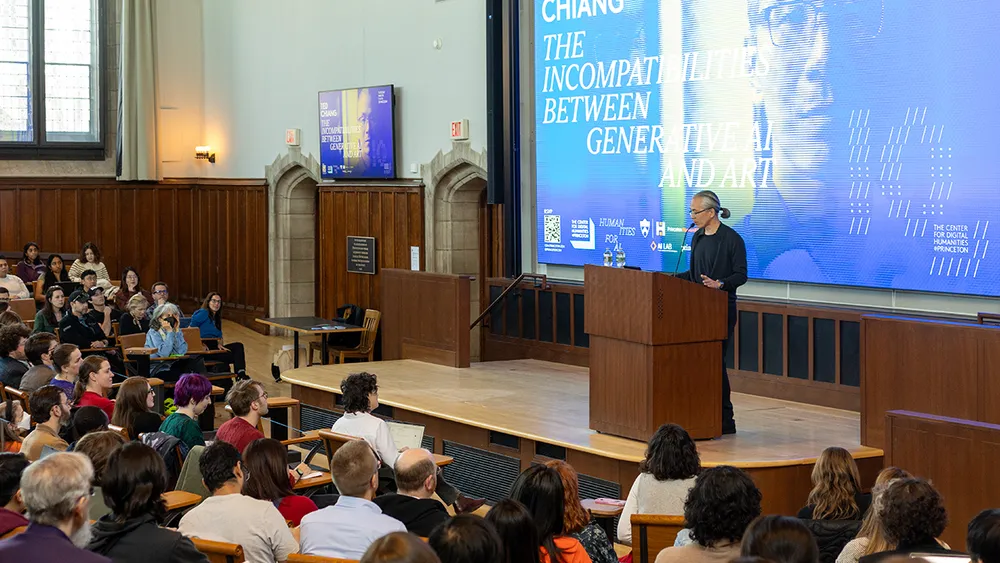
Ted Chiang presenting his talk at Princeton. March 2025. (Photo: Ali Nugent)
This past year, the Center for Digital Humanities celebrated its tenth anniversary with the theme “Humanities for AI.” Through this series of events, projects, and conversations, we explore how humanistic values and approaches are crucial to developing, using, and interpreting the field of AI.
As part of this initiative, we were thrilled to welcome award-winning writer Ted Chiang to Princeton on March 18 to present his talk “The Incompatibilities Between Generative AI and Art” with support from the AI Lab, Humanities Initiative, and Princeton Public Library. In this talk, he expanded on points from his essay “Why A.I. Isn’t Going to Make Art” in The New Yorker (August 2024). To delve deeper into topics such as artistic self-expression and the role of choice, as well as the tension between art and commerce, we invited Chiang to respond to a set of questions related to AI and its impact on humanities scholarship.
What does Humanities for AI mean to you?
The goal of universities is to produce graduates who can be more than just workers at widget factories, and studying the humanities is an essential part of that. Capitalism's goal is to turn the entire world into a widget factory, and AI is a powerful tool for achieving that. So I see Humanities for AI as an attempt to wrest the technology from the hands of capitalism and find uses for it other than extracting economic value from people.
In your opinion, has speculative fiction influenced the rise of generative AI?
Not directly. What we think of as generative AI only started around 2020 with programs like GPT-3 and DALL-E, and it wasn't something that even people working in AI had anticipated; they simply discovered that their programs had some unexpected capabilities and decided to lean into them. While there have been science-fiction stories about machine-generated fiction and art in the past — some of which seem eerily prescient in retrospect — I don't think anyone working in AI was aware of them or drawing inspiration from them.
If we zoom out from generative AI to consider AI more broadly, then I'd say speculative fiction has had a big role. The idea of the singularity — a point in time when machine intelligence exceeds human intelligence — was popularized by the science fiction writer Vernor Vinge. Vinge had an enormous influence on the Extropian community in the 1990s, and that community influenced AI research in the 2000s. I think it's also important to note that it was a non-fiction essay of Vinge's that was most influential, rather than his fiction. The practice of presenting fictional scenarios as non-fiction has now become the norm in Silicon Valley.
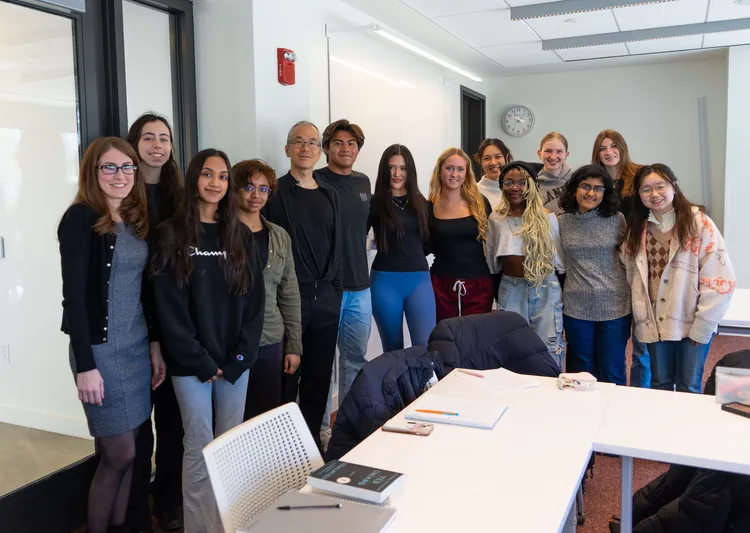
Chiang visits Dr. Naydan's first-year seminar, "Speculative Fiction: From Pygmalion to ChatGPT." Spring 2025. (Photo: Carrie Ruddick)
It's hard for me to imagine a scenario where AI helps writers do good work.
Do you envision scenarios where AI positively influences creative writing? What conditions do such possibilities require?
It's hard for me to imagine a scenario where AI helps writers do good work. Writing involves very little overhead; it's not like making a movie, where your budget determines what possibilities are available to you. You can write with a pencil and paper and do pretty much the same work as with a typewriter or a word processor. When you write, your medium is sentences, and I don't know what it would look like to have a technology that gives you greater control over sentences. Because of that, writing is relatively unaffected by advances in technology. This is also why I don't think the word processor has had a significant impact on creative writing; whatever changes we've seen in the novel over the last fifty years have probably been due to other cultural factors. I've read the claim that novels have gotten longer because of word processing, but I think even that has more to do with shifts in the publishing industry than with the increased ease of typing.
There might be certain creative possibilities opened up by explicitly using LLMs to write about LLMs, but I don't see that becoming a widespread practice. There's a form of visual art called scanography, which relies on the effects made possible by digital scanners. Without intending any insult, I think it's fair to say that scanography is a niche genre. I'd say that generative AI has comparable potential for creative writing.
Using ChatGPT to write your essays is like bringing a forklift into the weight room.
What advice do you have for college students who face the prospect of using generative AI in their studies?
Everyone should think carefully about using generative AI simply because the technology is built on environmental destruction, labor exploitation, and IP theft. College students should think extra carefully about it because, even if those other issues were magically resolved, using generative AI is largely incompatible with the purpose of education. In the talk I gave, I said, "When you’re a student at a university, you should think of yourself as an athlete in training, and the job you'll do after you graduate is the sport you will compete in. You don’t know specifically which sport you will play, and neither do your professors. What your professors do know is that strength training will help you. That’s what essay writing is; it’s strength training for the brain. Using ChatGPT to write your essays is like bringing a forklift into the weight room; you are never going to improve your cognitive fitness that way." Let me expand on that. Building strength requires exertion; if anyone offers you an exercise program that involves no exertion at all, you know it's not going to be effective. The improvements that come from doing cognitive exercise are not as rapid as those that come from physical exercise, but they are just as real. Writing an essay is hard because it forces you to use your brain in ways you haven't before, and that is precisely why it's useful. Your job is not to turn in completed assignments; it's to learn how to think. Turning in completed assignments can help you learn how to think, but only if you're the one who completed them.
Your job is not to turn in completed assignments; it's to learn how to think.
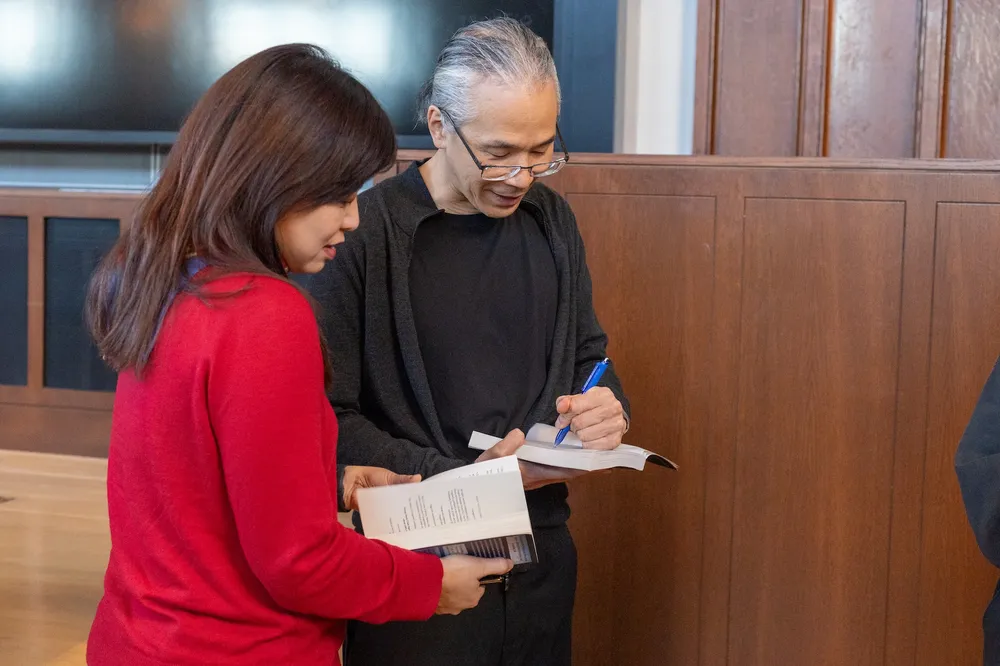
Chiang signing books at the end of the talk. March 2025. (Photo: Ali Nugent)
You ended your talk with a call for people to go out and create something meaningful to themselves or someone else. What is a creation you have read, seen, or experienced recently that has been meaningful to you?
The TV series ANDOR really impressed me. I don't particularly care about the STAR WARS universe; the only reason I tried this series was because Tony Gilroy was involved. In terms of craft, the series is a marvel; the dialogue, performances, production design, and music are all excellent. But completely separate from that, I think it's a remarkable depiction of what's involved in fighting fascism. Critics have said that one reason for the original STAR WARS' popularity was that, in the post-Vietnam era, it allowed Americans to feel good about themselves again by reminding them of "just wars" like the American Revolution or World War Two. What ANDOR does is more complicated and subversive. In the original movie, you could read the Empire as being a stand-in for Nazi Germany, but in ANDOR, it's hard for me to read the Empire as being anything other than a stand-in for the United States.
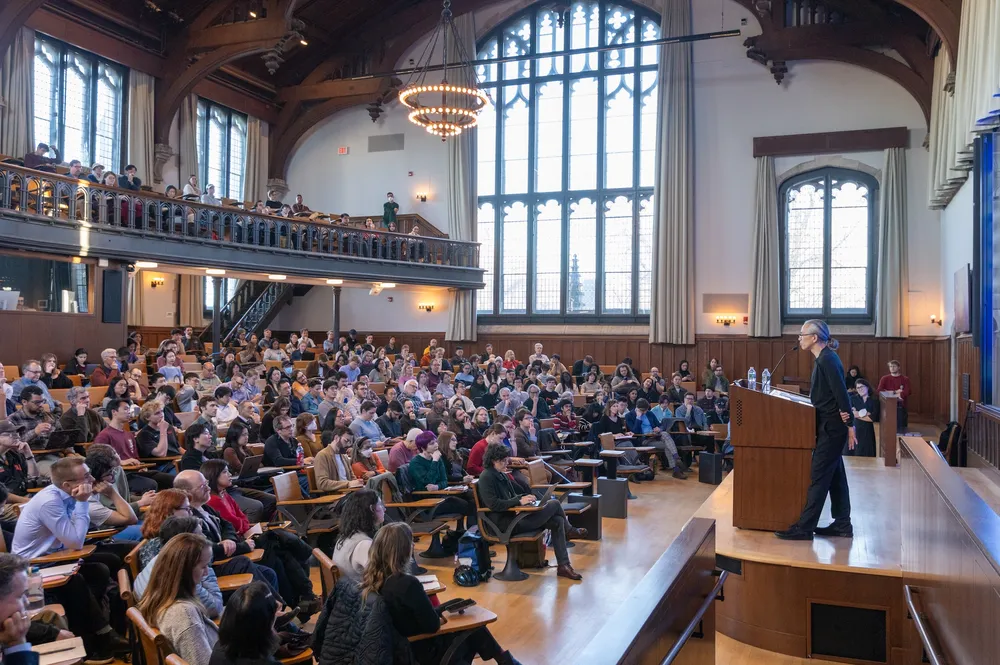
Chiang speaking to a packed McCosh Hall. March 2025. (Photo: Ali Nugent)
About Ted Chiang
Ted Chiang's fiction has won four Hugo Awards, four Nebula Awards, six Locus Awards, and the PEN/Malamud Award and has been reprinted in The Best American Short Stories. His first collection, Stories of Your Life and Others, has been translated into twenty-one languages, and the title story was the basis for the Oscar-nominated film Arrival. The New York Times chose his second collection, Exhalation, as one of the 10 Best Books of 2019. As a 2023 TIME100 Most Influential Person in AI, Chiang is described as “perhaps the world’s most celebrated living science-fiction author.”
Why A.I. Isn’t Going to Make Art — The New Yorker
By Ted Chiang. To create a novel or a painting, an artist makes choices that are fundamentally alien to artificial intelligence.
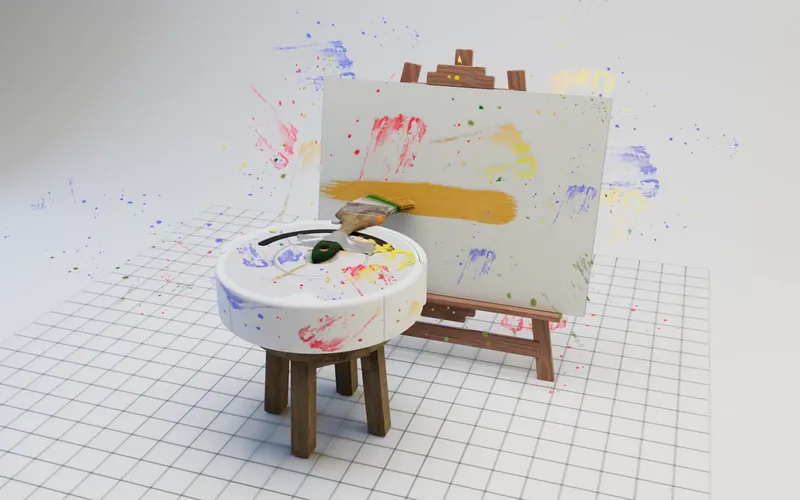
Life Is More Than an Engineering Problem — Los Angeles Review of Books
Julien Crockett speaks with Ted Chiang about the search for a perfect language, the state of AI, and the future direction of technology.
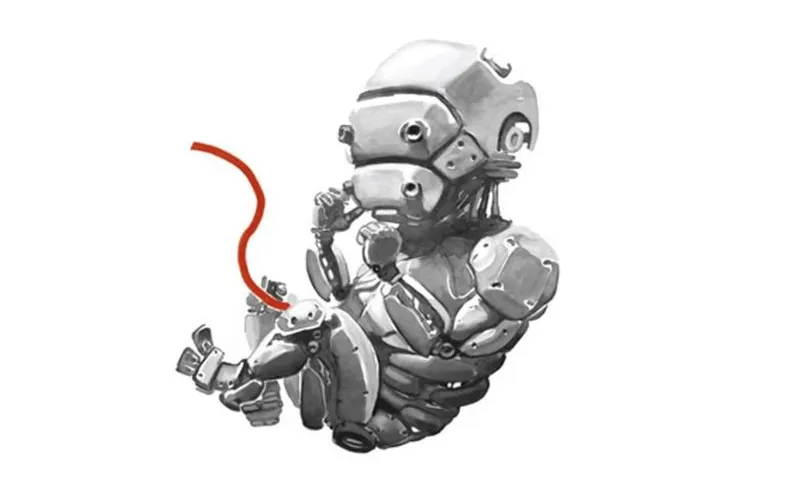
First-Year Students Explore AI Through the Lens of Speculative Fiction—Featuring Visits from Sci-Fi’s Literary Superstars
13 May 2025
Carrie Ruddick, Mary Naydan
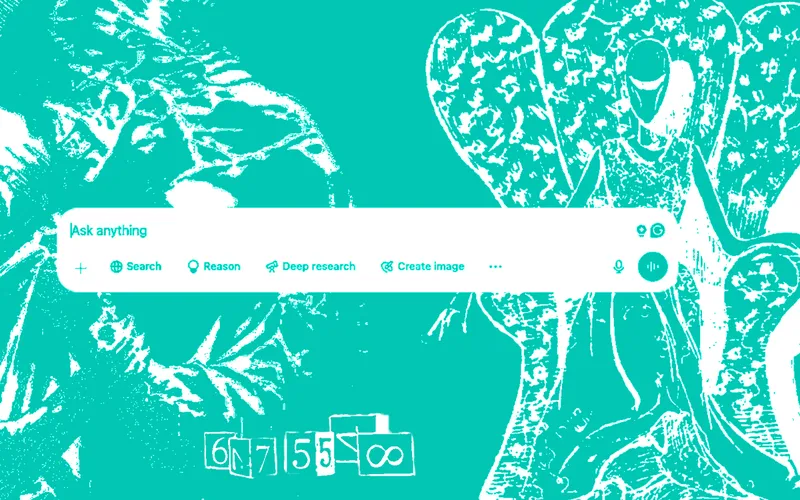
Ted Chiang explores “incompatibilities” between generative AI and art
By Allison Gasparini, AI Lab and Center for Statistics and Machine Learning
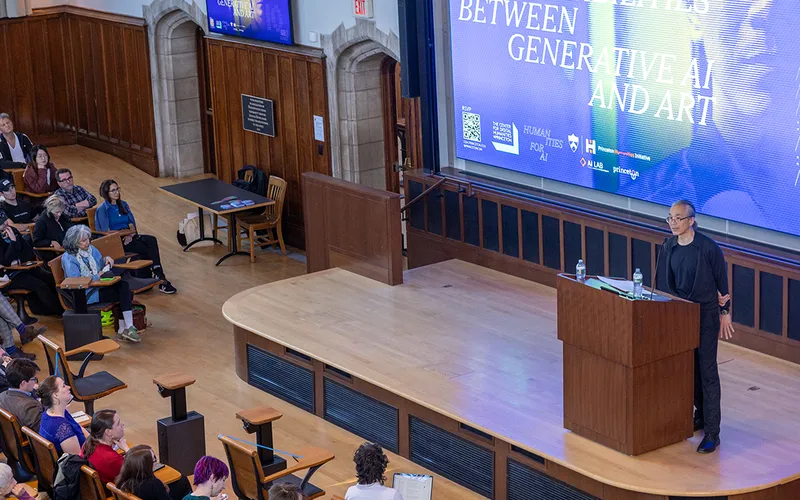
Ted Chiang: The Incompatibilities Between Generative AI and Art
